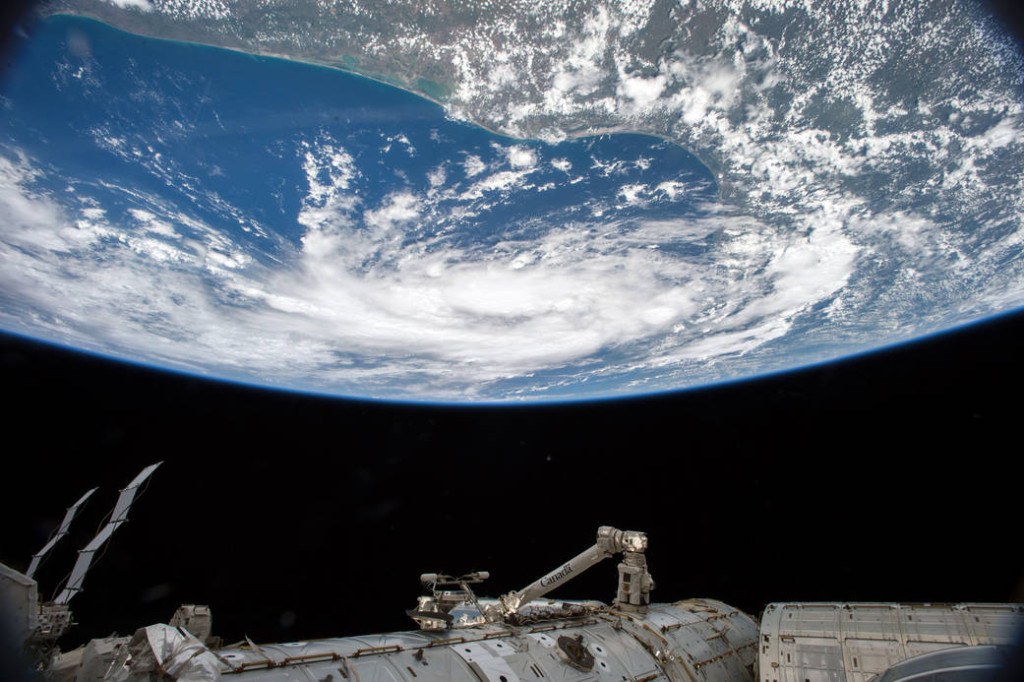Tropical Storm Bill wrung out almost 12 inches of rain over parts of eastern Texas, was downgraded to a depression and then handed off from the National Hurricane Center to the Weather Prediction Center.
That doesn’t mean the U.S. is done with Bill yet. The remains of the storm are going to soak Oklahoma, Arkansas and Missouri and then turn east. By the time the weekend rolls around, anyone planning to be outdoors from the Ohio Valley to the mid-Atlantic may want to check the forecast and have a Plan B ready.

Image Credit: NASA
“It looks like it will be a rainfall threat for the next three days, if not five,” said David Roth, a forecaster at the prediction center in College Park, Maryland.
Bill was born when a tropical wave from Africa ran into an upper-level low-pressure system near Mexico’s Yucatan, said James Franklin, branch chief of the hurricane center’s Hurricane Specialist Unit in Miami. The result grew into a tropical storm late Monday and went ashore in southeastern Texas on Tuesday.
The remains of Bill are forecast to wash floods across the central U.S. through Friday and damp weekend plans from Maryland to New Jersey. Yet there may be a spot in between where they could do a little good.
Agriculture Outlook
In parts of the corn belt, Bill’s arrival “is mostly positive,” said Joel Widenor, an agriculture meteorologist with Commodity Weather Group LLC in Bethesda, Maryland.
Tropical systems that crash into the Great Plains after going ashore along the Gulf of Mexico often come after August, when the rain isn’t needed or can cause major problems.
Having one in June, especially with the path it’s on, may have a benefit, Widenor said. “They are looking for a drink along the Ohio River and on either side of it.”
Any threat Bill may have posed to wheat crops probably won’t materialize either, because its path will be too far to the east, he added.
That’s not meant to draw a smile on someone else’s misery. Areas around Ganado, Texas, got 11.77 inches (30 centimeters) of rain as of 7 a.m. Wednesday, while Sealy and El Campo saw more than 8 inches, the National Hurricane Center said.
Trees went down across the state and numerous rivers rose to major flood levels, according to the National Weather Service said. The gauge on the Navidad River at Sublime, west of Houston, climbed more than 20 feet in a matter of hours
Flood Watches
Flash-flood watches stretched Wednesday from Texas to southern Illinois either as a direct result of Bill or because moisture from the storm interacted with another weather system across the central U.S.
The weather service in Tulsa warned the flooding could be life-threatening and isolated tornadoes were possible through Thursday.
In general, tropical storms can boost water resources throughout the southern and central U.S. and be a boon for agriculture, said Brian Fuchs of the National Drought Mitigation Center in Lincoln, Nebraska. But they can’t be counted on.
“The year that you need it to happen, it probably doesn’t,” Fuchs said. “I think the key to some of the prolonged periods of drought have been during times when it has been really quiet in the tropics.”
After the good and the bad, Bill will bring the ugly to the mid-Atlantic. Exactly when the rain will arrive depends on how other weather systems interact with the remnants, said Bruce Terry of the prediction center.
Eastern Rain
“Somewhere late Saturday into early Sunday,” Washington and Maryland will have their best chance of rain, Terry said. After that the rain will sweep up, probably south of Long Island and Cape Cod, and then off into the Atlantic.
Of course a lot can change between now and then. On Wednesday, the weather service forecast a 50 percent chance of a thunderstorm in New York on Sunday and a 60 percent chance of showers in Boston.
What of Bill after that?
Roth said it might be possible to find a trace of surface circulation off the coast of Maine on Monday: a patch of swirling clouds that would be the ghost of Bill.
Bill may actually trigger a negative phase of the North Atlantic Oscillation, said Andover, Massachusetts-based forecaster WSI.
Translation: cool air, mild weather and air conditioner off, which may be good news to everyone except natural gas traders.
Was this article valuable?
Here are more articles you may enjoy.


 Tesla Sued Over Crash That Trapped, Killed Massachusetts Driver
Tesla Sued Over Crash That Trapped, Killed Massachusetts Driver  Charges Dropped Against ‘Poster Boy’ Contractor Accused of Insurance Fraud
Charges Dropped Against ‘Poster Boy’ Contractor Accused of Insurance Fraud  Cape Cod Faces Highest Snow Risk as New Coastal Storm Forms
Cape Cod Faces Highest Snow Risk as New Coastal Storm Forms  Founder of Auto Parts Maker Charged With Fraud That Wiped Out Billions
Founder of Auto Parts Maker Charged With Fraud That Wiped Out Billions 